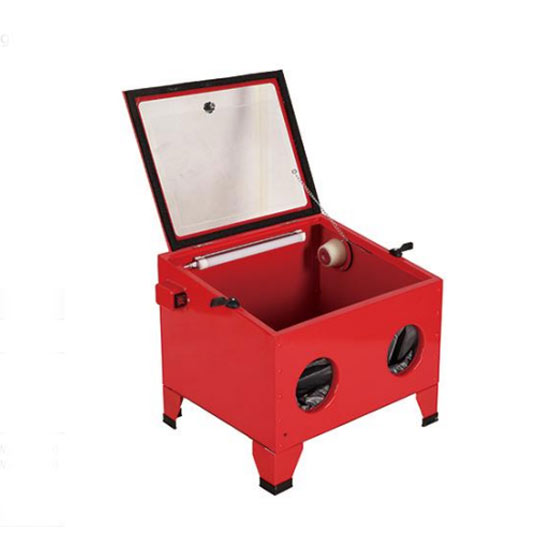How Does a Sandblast Cabinet Work?
A sandblasting cabinet is a specialized tool that uses pressurized air to propel abrasive media, such as sand, glass beads, or aluminum oxide, at high speeds to remove surface contaminants, smooth rough surfaces, or shape hard materials. The cabinet is designed to contain the media and the dust generated during the process, making it a safe and efficient way to perform surface finishing tasks.
Here is how a sandblast cabinet typically works:
Loading the Cabinet
The first step is to load the cabinet with the part or object that needs to be cleaned or treated. The part is placed inside the cabinet and secured in a position where it can be easily accessed by the operator. The cabinet is then sealed shut, and the operator puts on protective gear, including gloves, goggles, and a respirator, to protect against dust and debris.
Pressurized Air
The next step is to introduce pressurized air into the cabinet. The air is usually compressed using an air compressor and stored in a tank until it is needed. When the operator pulls the trigger of the sandblast gun, the air is released and directed towards the media, accelerating it to high speeds. The velocity of the media can be adjusted by controlling the pressure of the compressed air.
Large Volume Sand Blasters Cabinet
Abrasive Media
Once the pressurized air is flowing, the operator introduces the abrasive media into the cabinet. The media is usually stored in a hopper, which is located above the cabinet and connected to a hose. The operator can adjust the flow of media by controlling the valve on the hopper. The type of media used depends on the task at hand, as different media have different levels of abrasiveness and are better suited for certain materials or surfaces.
Blasting Process
With both the pressurized air and abrasive media in place, the operator can begin the blasting process. The gun is directed towards the part or object, and the operator moves it back and forth to ensure even coverage. The force of the media hitting the surface removes any contaminants, such as rust or paint, and can also smooth out rough surfaces or shape hard materials. The operator can adjust the distance between the gun and the surface, as well as the angle and direction of the gun, to achieve the desired results.
Dust Collection
As the media impacts the surface, it creates dust and debris that can become airborne and pose a health hazard to the operator. To prevent this, a dust collection system is usually integrated into the sandblast cabinet. The system uses a vacuum to pull the dust and debris into a collection bag or filter, which can be disposed of safely. Some cabinets also have a reclamation system that recovers and recycles the media, reducing waste and cost.
Finishing
Once the blasting process is complete, the operator can remove the part from the cabinet and inspect it. If the desired finish has been achieved, the part can be further processed or used as-is. If more work is needed, the operator can repeat the blasting process or use other techniques, such as painting or coating.
In summary, a sandblast cabinet uses pressurized air and abrasive media to remove surface contaminants, smooth rough surfaces, or shape hard materials. The cabinet is designed to contain the media and the dust generated during the process, making it a safe and efficient way to perform surface finishing tasks. By adjusting the pressure, flow, and type of media, the operator can achieve the desired finish for a wide range of materials and surfaces.
None


Comments